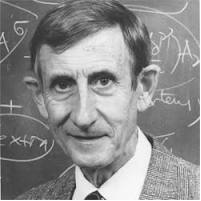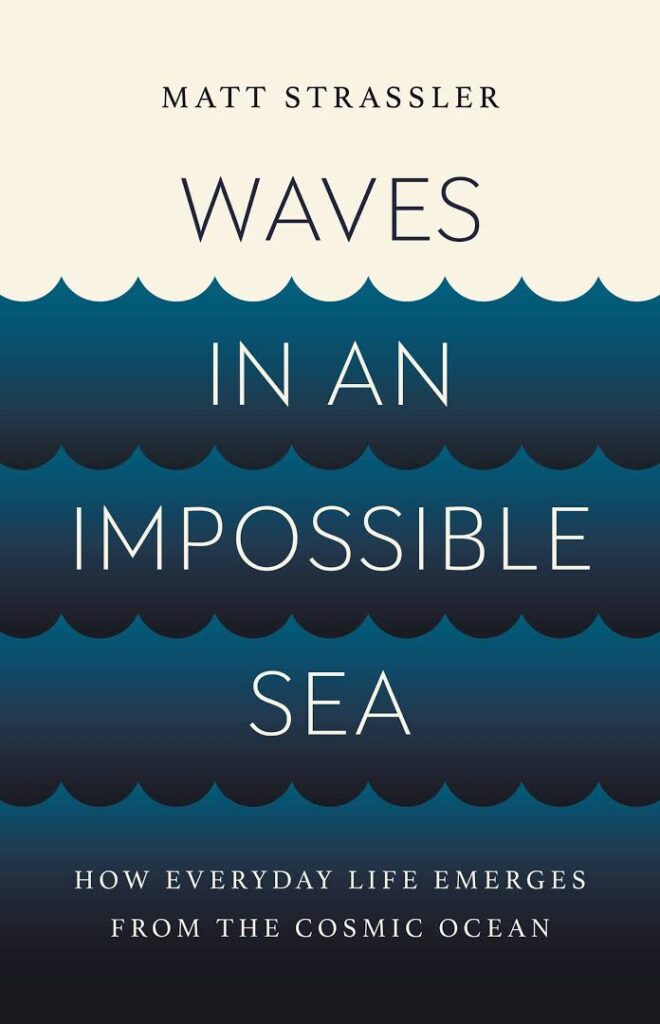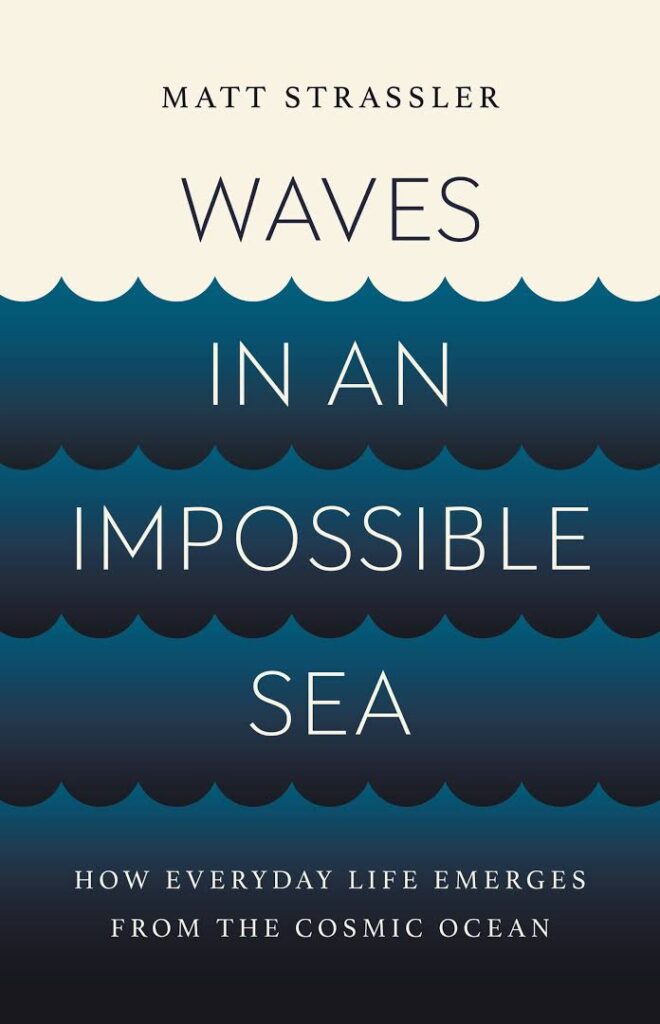I spent the last two days at an extraordinary conference, “Dreams of Earth and Sky”, celebrating the life and career of an extraordinary man, one of the many fascinating scientists whom I have had the good fortune to meet. I am referring to Freeman Dyson, professor at the Institute for Advanced Study (IAS), whose career has spanned so many subfields of science and beyond that the two-day conference simply wasn’t able to represent them all.
The event, held on the campus of the IAS, marked Dyson’s 90th year on the planet and his 60th year as a professor. (In fact his first stay at the IAS was a few years even earlier than that.) The IAS was then still a young institution; Albert Einstein, John Von Neumann, Kurt Gödel and J. Robert Oppenheimer were among the faculty. Dyson’s most famous work in my own field was on the foundations of the quantum field theory of the electromagnetic force, “quantum electrodynamics”, or “QED”. His work helped explain its mathematical underpinnings and clarify how it worked, and so impressed Oppenheimer that he got Dyson a faculty position at the IAS. This work was done at a very young age. By the time I arrived to work at the IAS in 1996, Dyson had officially retired, but was often in his office and involved in lunchtime conversations, mostly with the astronomers and astrophysicists, which is where a lot of his late career work has been centered.
Retirement certainly hasn’t stopped Dyson’s activity. His mind seems to be ageless; he is spry, attentive, sharp, and still doing science and writing about it and other topics. When I went up to congratulate him, I was surprised that he not only remembered who I was, he remembered what I had been working on in 1992, when, as an unknown graduate student on the other coast, I had sent him a paper I had written.
By the way, it’s somewhat bizarre that Dyson never won a Nobel Prize. Arguably it is part of the nature of the awarding process, which typically rewards a specific, deep line of research, and not a polymath whose contributions are spread widely. Just goes to show that you have to look at the content of a person’s life and work, not the prizes that someone thought fit to award to him or her. Still, he has his share: Dannie Heineman Prize for Mathematical Physics 1965; German Physical Society, Max Planck Medal 1969; Harvey Prize 1977; Wolf Foundation Prize in Physics 1981; American Association of Physics Teachers, Oersted Medal 1991; Enrico Fermi Award 1995; Templeton Prize for Progress in Religion 2000; Henri Poincaré Prize 2012.
The thirteen talks and several brief comments given at the conference, all of which in one way or another related to Dyson’s work, were organized into sessions on mathematics, on physics and chemistry, on astronomy and astrobiology, and on public affairs. All of the speakers were eminent in their fields, and I encourage you to explore their websites and writings, some of which were controversial, all of which were interesting. For non-scientists, I especially recommend Stanford Professor Emeritus Sid Drell’s extremely interesting talk about nuclear disarmament (which he’s been working towards for decades), and a thought-provoking if disconcertingly slick presentation by Dr. Amory Lovins of the Rocky Mountain Institute on what he sees as a completely realistic effort, already underway, to wean the United States of its addiction to oil — with no net cost. Those with a small to moderate amount of scientific background may especially enjoy MIT Professor Sara Seager’s work on efforts to discover and study planets beyond our own solar system, Texas Professor Bill Press’s proposal for how to rethink the process of drug trials and approvals in the age of electronic patient records, Sir Martin Rees’s views on the state of our understanding of the universe, and Caltech’s Joseph Kirschvink’s contention that scientific evidence tends to favor the notion that life on this planet most likely started on Mars.
But really, if you haven’t heard about all the different things Freeman Dyson has done, or read any of his writings, you should not miss the opportunity. Start here and here, and enjoy!
Many happy returns, Professor Dyson; you have been an inspiration and a role model for several generations of young scientists, and may you have many more happy and healthy years to come!




32 Responses
Asking questions are genuinely pleasant thing if you
are not understanding anything totally, however this article provides nice understanding even.
Hello there! This is my first comment here so I just wanted to give a quick shout out and say I really enjoy reading your articles.
Can you suggest any other blogs/websites/forums that cover the same
subjects? Thanks!
I’m interested in astrobiology, so I’ll note that Kirschvink’s (and before him Bennett’s) notions are outdated.
We do have trace fossils in early zircons that shows that early Earth both had extensive oceans and extensive dry land weathering. So even if we stick with the now less popular pure RNA world scenario instead of a “dirty” RNA wold (coevolving metabolism, proteins, RNA), Earth could sustain the pathway.
And while the martian timeline is still confused and arguable, there is a successful theory that it was habitable ~ 3.8 – 3.6 Ga ago, when Tharsis let off enough volatiles for surface water. 200 Ma is enough for life to arise, but note that it is after the first (arguable) trace fossils on Earth. (Isua BIFs that predicts Fe reducers > 3.8 Ga bp) And after the main late bombardment transfered material.
“it’s somewhat bizarre that Dyson never won a Nobel Prize. Arguably it is part of the nature of the awarding process, which typically rewards a specific, deep line of research, and not a polymath whose contributions are spread widely.”
Well, the article’s discussion of prizes is somewhat bizzare. Yes, the Nobel Prize awards individuals that has contributed to science progress, not the person. Nothing bizarre here.
Added to that the Nobel Prize is centered on discoveries, since Nobel was an inventor and thought mostly inventions but also discoveries were useful. Dyson may never have contributed with such. (E.g. if someone discovers a Dyson swarm, he can get rewarded.)
Also, the Templeton prize is not in science and has an anti-science purpose, to mix beliefs of religion into facts of science. An analog is if we wanted to award astrology, once a religious tool, to a scientist. That Dyson got it is not meritorious (and he could have abstained).
Oops. I posted an earlier revision:
“200 Ma is enough for life to arise, but note that it is after the first (arguable) trace fossils on Earth. (Isua BIFs that predicts Fe reducers > 3.8 Ga bp.) And it is after the main late bombardment transferred material in either direction. Maybe martian life, if any, was or is tellurian in origin.”
Dyson himself has an amusing take on the Nobel Prize, one he borrowed from Jocelyn Bell Burnell: “It’s much better to have people ask me why I didn’t win the Nobel Prize than to have them ask me why I did.”
Were the talks at the Dyson conference filmed? If so, is there a URL where they can be found?
Dyson has given some brief remarks on string theory:
pages 221 to 222, http://www.ams.org/notices/200902/rtx090200212p.pdf “Birds and Frogs” by F. J. Dyson, 2009
I would say Dyson is neutral on string theory. My opinion is that among the Nobel prize winners, Nambu, Gell-Mann, Weinberg, and Gross are pro-string (and Salam was pro-string in his lifetime) while Glashow, Anderson, McLaughlin, and Richter are anti-string (at least in its present form). Is my opinion more-or-less correct and are there other Nobelists who have given strong opinions on string theory?
It was at my eighteen: I read “Disturbing the Universe”. Freeman Dyson was a light in my mind. No being right, no being wrong: instead, at center of science is reasoning, observing, then reasoning again. He thought man is, in a way, a measure of all things. Nor on top of things, but neither below of them.
No other scientist got me so deep inside Terence’s meaning of “I am a human being, I consider nothing that is human alien to me”.
This is Freeman J. Dyson for me.
Well put!
Feynman had some wry comments about himself about how old scientists are likely to be wrong (and this was when asked about his opinion of string theory).
Freeman Dyson is certainly a great scientist. But imagine what Richard Feynman must have been like: Dyson is reported to have been awed by Feynman’s genius!( see J. Gleick’s biography of Feynman, “Genius”)
I have read about Freeman Dyson’s important work in QCD but the only time I heard him was in an interview on 60 minutes or some such program during which, if I remember correctly, he talked about why he didn’t believe in global warming, which I found rather disconcerting.
To be exact, he believes that the influence of human activities releasing CO2 to the atmosphere has a very little impact on mean temperature change in Earth, which I agree with. In fact we are probably approaching a cold little age.
His views on the subject seem to have shifted a little, to be honest it sounds more like hes been taken in by the PR than anything else. He has openly admitted to not knowing about the details of the subject and believes there is a witch hunt against its critics.
As far as I can tell there isnt, every single example of major criticism Ive found has usually already been studied and found to be sorely lacking. (Thats not to say there is no genuine criticism but that is usually far from overturning the theory and more a part of the process of refining the models. While strongly debated it isnt usually shunned.)
In fact in many cases the opposite is true, a sizable chunk of the stories printed by ‘skeptical’ news sources are based on scientific papers that say literally the opposite of what has been printed.
I should note, there are people on the other side of the fence who have attempted to hype up the effects where none would be visible over the time scales they are discussing. This is more just an indication that you should never believe a newspaper rather than you shouldnt believe the science.
It is a bit baffling why even fairly recently he has talked about an area he acknowledges he lacks understanding in when the stakes are so high, but then I dont think Ive met a person who doesnt believe something daft. Cant forget that Newton himself made calculations for the date of the biblical apocalypse.
Hes brilliant but hes still human.
Freeman Dyson is an old school scientist, he was doing research of climate change before it became an issue and is commenting on it from that position. In fact, Freeman Dyson is more than concerned about our CO2 emissions and overall influence on climate. He just believes our confidence in available projections is too high and our approach to avert possible disasters is wrong.
Global Warming and its derivatives are not science, it’s a religion for most people.
Science so far doesn’t tell anything more than “it may or may not happen”. There is no rock-solid proof of the doom to come. And there is no way to rule it out. So it’s up to people which part of the result do they stress out more.
If there is low probability that a drug will give you cancer, you’ll probably not take it. However there is also always low probability that you will be killed by a car and you go out anyway. If there is low probability that our CO2 emissions may cause problems in distant future, it’s matter of belief what position you assume to it.
Professor Dyson largely left the field many years ago and is self admittedly ignorant of the details. He may well be concerned but he is not a professional climatologist.
The confidence in the models seems acceptable within the scientific community, several independent models exist, all ended up showing similar trends. Several major challenges have occurred and failed to dislodge them, and they are quite aware of and show the inaccuracies while continually updating the estimates as they did in the recent IPCC report.
Outside of the scientists the lack of confidence is overwhelmingly beyond where it should be. Last I checked over a third of people in the US dont believe warming is happening at all and less than half believe we are having a major impact. This is contrary to nearly all of the evidence available, contrary to even what Professor Dyson believes, and why we really dont need prominent scientists suggesting its not that big an issue. (Just as much as we dont need people like Al Gore fear mongering and damaging the credibility of the science by bending the truth.)
It is nonsense to suggest that all of the work that has been done effectively tells us it may or may not occur. There is of course never ‘rock-solid’ proof, there are probabilities and error tolerances and they are telling us what is by far the most likely outcome and have done for quite some time now in many freely available papers and reports from reputable climatologists.
Anyway, I dont want to get too bogged down in the details. Professor Dyson has otherwise done incredible work across so many fascinating fields. The paper about looking for the large scale capturing of a stars energy he fleshed out (and which spawned the famous Dyson sphere.) was one of the first scientific concepts I can remember being really awed by and firing up my interest in the sciences for years to come.
Just the tip of the iceberg of work hes done.
My salute to such a great person.
His “proof” of asymptotic character of QED series has a flaw: it assumes that after renormalization all terms are finite, but they are equal to zero – no elastic processes are possible. One has to sum up soft diagram contributions nearly exactly and that changes all the series terms. All terms now contain alpha in a non trivial way. So convergence of such (realistic) series has not been ever considered.
Interesting stuff, Vlad.
I particularly enjoyed Kirschvink’s talk. In fact I’m thinking of rewording my resume, “Born on Mars … Raised on Earth.”
Almost assuredly, Dyson will not win the Nobel Prize. I see that as falling somewhere between a pity and a tragedy. Personally, I think the folks in Stockholm should follow the lead of the Academy of Motion Pictures and create a Lifetime Achievement Award. There, Dyson would be among the favorites. A kinder gentleman you will never find.
“Born on Mars … Raised on Earth.”
It could have happened that way. But as I note in my lengthy comment below, there are some problems with that. On the contrary, if recent datings becomes as successful as they promise, the situation could be the reverse.
Maybe Musk grandchildren will have reason to put on their CV: “Born on Earth … Raised on Mars.” [I know, I know, not as surprising.]
Still disturbing the universe? The universe needs some vacuum cleaning.
Perhaps he will win the prize this year. Not too many other contenders 🙂
Higgs and Englert are not nervous about that…
He didn’t win the Nobel Prize because he wasn’t politically correct (see e.g. his opinion about climate change).
That’s an insane comment. Have you ever read the kinds of things Martinus Veltman says about other scientists? and he won. The Physics Prize committee is not at all like the Peace Prize committee.
If Nobel is not without politics, why did they deny Mohandas Karamchand Gandhi Nobel peace prize (According to Nobel committee, that was their greatest blunder. He was denied to please Churchill who did not hide his disdain for the man) .
Or for that matter the discovery that DNA was the basis of inheritance by Avery http://www.jbc.org/content/277/16/13355
Sir, you did not read my reply, so I am not going to answer you until you do.
The inconvenient truth is that human conduct is not the cause of global warming but an exogenous accelerator of an endogenous natural process.
@martenvandijk: Those of us who hasn’t the luxury to reject hard won science facts notes that the observation that global warming is caused by human actions is now at 3 sigma, physics quality of theory testing.
You can have your opinion but you can’t own facts.
I don’t think these two things have anything to do with each other. He deserved Nobel prize long before climate was an issue.